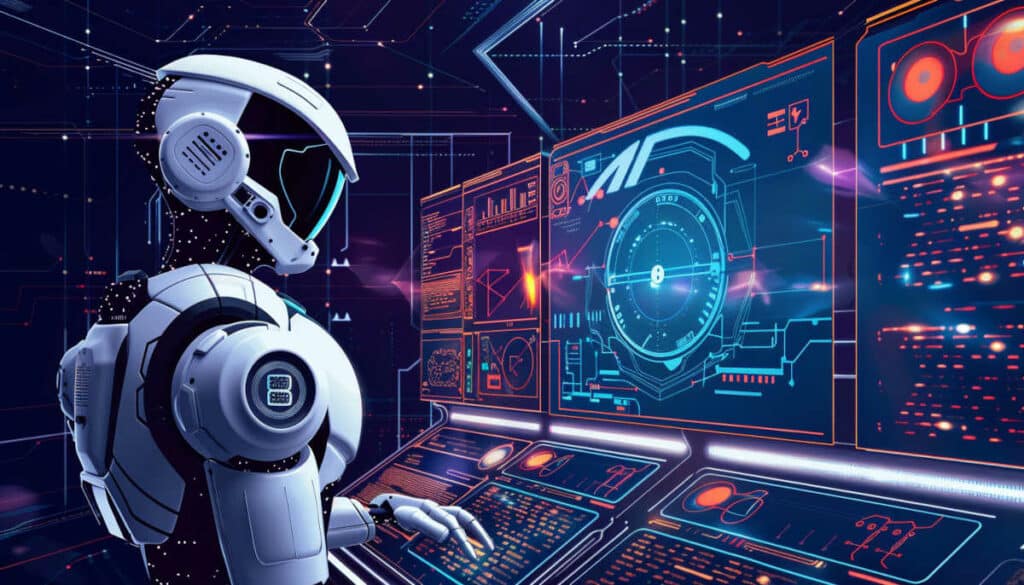Cybersecurity is now a top priority for businesses, governments, and people in today’s digitally connected world. Cybercriminals are always changing how they do things, making it difficult for old security systems to keep up. Attacks like ransomware, phishing, and zero-day exploits are too complex for static rules and signature-based detecting methods to keep you safe. Here’s where Artificial Intelligence (AI) comes in and changes everything. Advanced algorithms and adaptive learning make AI possible for real-time protection against threats that are always changing.
Companies investing in machine learning development and consulting services can now create cybersecurity systems that not only act faster but also predict and stop attacks before they happen.
The Growing Complexity of Cyber Threats
Attacks on computers are getting smarter and sneakier all the time. Hackers get around most barriers by using automation, malware that is run by AI, and even deepfakes. Here are some common problems:
- Attacks that target unknown vulnerabilities that conventional systems are unable to detect are known as zero-day exploits.
- Ransomware-as-a-Service: Ready-made attack kits that are sold to hackers who aren’t very good.
- Phishing 2.0: spear-phishing texts that are very specific and are made with AI.
- Insider threats are actions taken by workers that are either malicious or careless and are difficult to track down.
Standard security systems often don’t work because they depend on rules that have already been set. They can’t adapt to threats they don’t know about or that are always changing. In this case, methods based on AI and machine learning give us a much-needed edge.
How AI Enables Real-Time Cybersecurity
AI makes cybersecurity stronger in several important ways:
1. Threat Detection and Prediction
In order to detect anomalies, machine learning models can look through enormous amounts of data about user behavior, network traffic, and system logs. AI is different from rule-based systems because it can find trends that point to a possible attack, even if they have never been seen before.
For instance, if an employee’s account downloads gigabytes of sensitive data all of a sudden at 2 a.m., an AI system can quickly mark it as suspicious. Organizations can use Machine Learning Development Services to make models that are specifically designed to learn from their surroundings and adapt over time.
2. Automated Incident Response
During a hack, time is very important. AI systems can automatically separate devices that are vulnerable, block malicious IP addresses, and let admins know about the attack before it spreads. Because of this technology, there is less downtime and less need for human help
3. Behavioral Analytics
By examining how people and devices behave, AI can do more than just detect signatures. AI can detect anomalies and take preventative measures if a user suddenly logs in from several countries in the same hour.
4. Phishing and Fraud Prevention
To detect subtle phishing attempts, AI models trained with Machine Learning Consulting Services can sift through millions of emails. They can also spot fake transactions right away, which is very important for businesses like banks and online shopping.
The Role of Machine Learning in Cybersecurity
AI-powered cybersecurity is based on machine learning (ML). As a result, systems can keep improving their defense and monitoring systems. Some of the most important ways that ML is used are
- Supervised Learning: Models that have been taught on labeled datasets to spot known types of malware.
- Unsupervised Learning: Finding threats that weren’t known before by noticing things that don’t seem right.
- Systems that learn the best ways to defend themselves by modeling cyberattacks are called reinforcement learners.
Businesses can combine these methods into their cybersecurity systems by working with companies that offer machine learning development services, making those systems smarter and more adaptive.
Why Businesses Need Consulting Services
It’s clear that AI can help with cybersecurity, but putting it into practice can be hard. Because of this, a lot of organizations use machine learning consulting services. Consulting companies give advice on the following topics:
- Looking at the current holes in cybersecurity.
- Picking out the right machine learning models for different threats.
- Adding AI tools to the IT system that is already in place.
- Making sure that data security rules are followed.
- Giving ongoing help and improvement.
Businesses can get the most out of their investments in AI-powered security solutions thanks to this strategic method.
Future of AI in Cybersecurity
Looking ahead, AI will still be a very important part of protecting against cyber threats. Here are some new trends:
- AI-powered deception technology: making fakes and traps to trick enemies.
- Organizations can work together on danger intelligence without sharing private information thanks to federated learning.
- With quantum-resistant algorithms, we’re getting ready for the age of quantum computers by building defenses.
- Proactive Cyber Defense: Using AI to spot threats early and stop them before they happen.
Companies that adopt these new ideas quickly, especially with the help of machine learning development services, will be miles ahead of the competition when it comes to cybersecurity.
Final Thoughts
These days, cybersecurity isn’t just about putting up walls; it’s also about being one step ahead of attackers. Machine learning and AI work together to predict, detect, and stop threats in real time. When companies use machine learning development services and machine learning consulting services, they protect their digital assets in a smarter way.
Since online threats are always changing, using AI in cybersecurity is no longer a choice—it’s a must. Organizations can create future-ready, adaptive, and resilient defenses against an ever-changing digital war by combining cutting-edge technology with expert advice.
